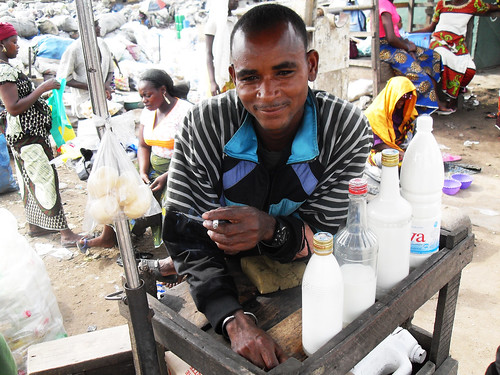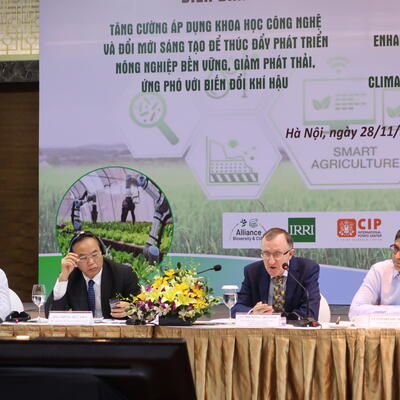
Research on local technologies to improve dairy hygiene in Côte d’Ivoire presented at international conference

Man selling raw milk along the railway tracks in Abobo, Abidjan, Côte d’Ivoire (photo credit: CSRS/ILRI/Sylvie Mireille Kouamé-Sina).
Interventions to improve food safety and nutrition may be some of the best investments for improved health of populations. Ideally, these investments should target multiple disciplines to link health and education to agricultural systems.
Fermentation of dairy products is one such intervention that helps to extend their shelf life and improve microbial safety and nutritive quality. Sylvain Traoré, a postdoctoral scientist at Centre Suisse de Recherches Scientifiques in Côte d’Ivoire, has been continuing with research he started through the Safe Food, Fair Food project on the use of participatory methods to improve the safety of dairy products in informal markets.
Traoré recently carried out a cross-sectional study in Korhogo, northern Côte d’Ivoire to assess local dairy fermentation technologies and map the local dairy supply chain to identify areas where interventions can be made to improve milk safety in the community.
Through a scholarship from the European Food Safety Authority (EFSA) and with funds from the Safe Food, Fair Food project, he travelled to Milan, Italy in October 2015 for the EFSA Second Scientific Conference where he presented the findings of his research study.
The study noted that informal practices contributed to poor quality of fermented dairy products and there were instances of milk contamination with disease-causing Streptococcus bacteria. Among the proposed interventions are education and awareness creation on dairy hygiene, especially among school children, as well as promotion of healthy milk products in the school canteen program in Korhogo through adapted local dairy technology.
Access the abstract and poster presentation: Risk management and communication in informal dairy sector in Côte d’Ivoire: Options for sustainable livelihoods
Written by Tezira Lore




















